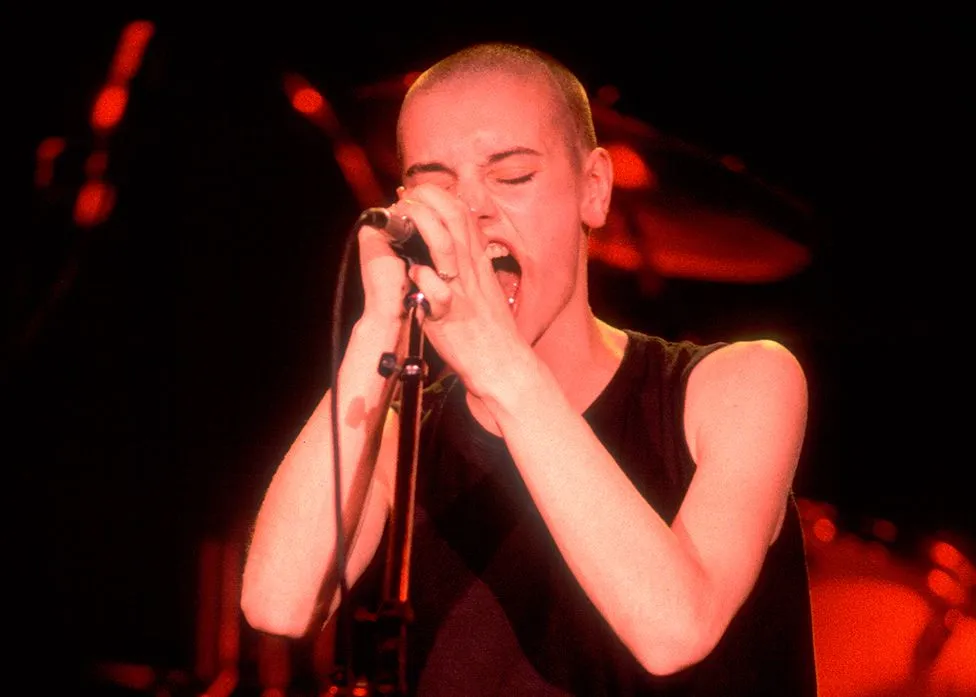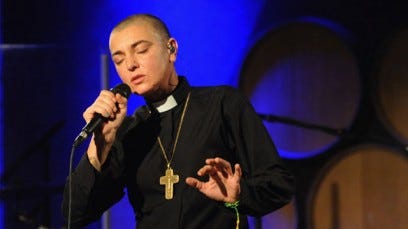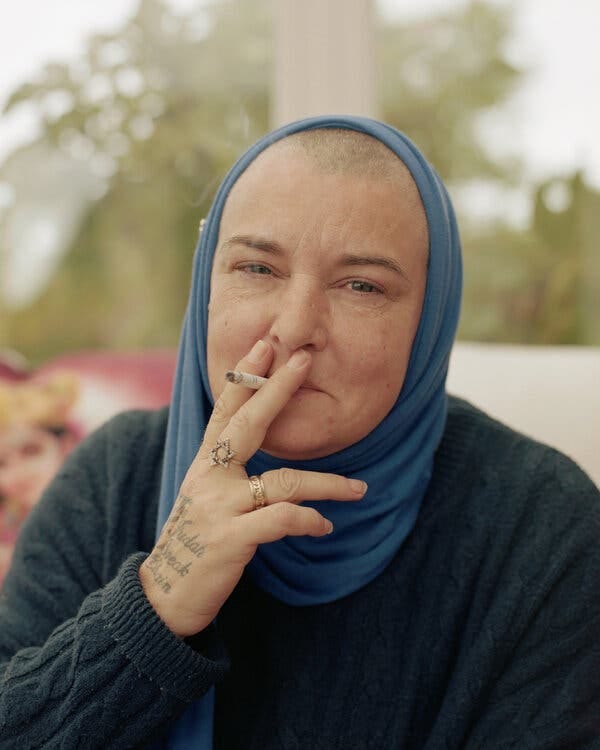never get old

For those who usually only get the Monday essays, I’m sharing this more broadly for those of you for whom this might resonate.
To subscribe and get missives twice a week, and to support the labor that goes in to this project, go here (you can also sign up here to start getting the Monday missives for free. As always, access to money shouldn’t be a gatekeeper; email lifeisasacredtext@gmail.com to ask for a hookup if you’d like to be part of the inner sanctum but paying isn’t for you right now.)
Unlike most Thursday posts, this one is unlocked; feel free to share it with people who might find it meaningful.
I was 13 when The Lion & The Cobra came out. My feminist awakening was about making space for truth & rage (not necessarily in that order) and the idea that women could exist without striving for prettiness.
The artist who lived most of her life and recorded her music as Sinéad O’Connor—who eventually changed her name to Shuhada' Sadaqat—was so major. So ahead of her time. And so criminally underappreciated. Always.
She was a woman who put truth over protecting power, who dared not only to allow her pain to be seen in public, but to speak frankly about it.
And she was excoriated for it.
May her memory and her music forever be a blessing and a revolution.
If you already knew her music, spend some time with her now, savoring her genius, and her extraordinary, expansive soul, thirsting for justice, always.
If you are new to her music, welcome.
She was 19 when she recorded her first album, The Lion and the Cobra, in 1987. She didn’t like or trust the producer the record label gave her, so she fired him and did the job herself—winding up in £100k+ debt before the album even came out.
This is an artist with bravery, talent and vision.
Even from a very young age.
She was, I think, always intensely spiritual. Her first album is named for a line from Psalm 91, recited by Enya in Gaelic on “Never Get Old”:
For God will order God’s angels
to guard you wherever you go.
They will carry you in their hands
lest you hurt your foot on a stone.
You will tread on lions and cobras;
you will trample young lions and asps. (Psalm 91:11-13)
And certainly the language of the religion with which she had been raised and harmed suffused her music in many ways.
In 2010, writing a condemnation of the Catholic Church’s “hollow” apology for sexual abuse in the Washington Post (“Despite the church's long entanglement with the Irish government, Pope Benedict's so-called apology takes no responsibility for the transgressions of Irish priests,”) she observed the following, about her choice to tear up the photo of the Pope in 1992 in protest of the Catholic Church’s culpability in the sexual abuse of children:
I knew my action would cause trouble, but I wanted to force a conversation where there was a need for one; that is part of being an artist. All I regretted was that people assumed I didn't believe in God. That's not the case at all. I'm Catholic by birth and culture and would be the first at the church door if the Vatican offered sincere reconciliation.1
Her mother was horrifically abusive in pretty much every way, and then died in a car accident when she was a teenager.
The photo of the Pope that she tore up on Saturday Night Live was one that she took down off her mother’s bedroom wall on the day of her death.
As a result of shoplifting—encouraged by her mother—when when was 15, she was placed in a “Magdalene asylum,”—a workhouse for “fallen women”—for 18 months. These places were described by one Irish historian as “a mechanism that society, religious orders and the state came up with to try to get rid of people deemed not to conforming to the so-called... Irish identity."2
Shuhada'/Sinéad, who called the place a “prison,” described being forced to scrub priests’ clothes with cold water and soap in a basement as rats ran in pipes overhead. (Other kinds of) abuse in these spaces was rampant—there has been a recent uncovering of significant mass graves at a number of them.
Is it any wonder that her first album is an explosion of rage, of pain, of truth-telling?
She compares her experiences of abuse to the destruction of the Temple:
Ran down and the lady said it
It got torn down
And the priest just said
It got burned
They give me five years five years
It's my turn
Oh Jerusalem
And oh, oh, the dragons she slays and the phoenixes she burns in Troy, very much about her mother and a reference to Yeats’ “No Second Troy.” Women who cause everything to burn.
At her first big intro to US audiences, the Grammys, she dyed or painted a Public Enemy logo (a Black man in crosshairs) as an act of solidarity with the hip-hop artists erased from the Grammys when they decided not to air the awarding of the new category of best rap album.
Her next album would include the again far-ahead-of-her-time antiracist ballad about racist police, “Black Boys on Mopeds.”3
Margaret Thatcher on TV
Shocked by the deaths that took place in Beijing
It seems strange that she should be offended
The same orders are given by her
…
England's not the mythical land of Madame George and roses
It's the home of police who kill Black boys on mopeds…
About the tearing of the Pope image, she once said,
“Everyone wants a pop star, see? But I am a protest singer.
I just had stuff to get off my chest. I had no desire for fame….”

Her next album was most famous for the beautiful Prince cover, but there was so much else happening there—songs about grief, miscarriage, police brutality, of course, about the painful dissolution of marriage, about transformation.
She says that she went to a medium after her mother’s death, at some point; she says that the phrase “I do not want what I haven’t got,” came to her as her mother’s soul making peace with the fact that forgiveness withheld by Shuhada'/Sinéad’s sister—but evidently not herself. But the whole thing reads (and sounds) like liturgical poetry.
I'm walking through the desert
And I am not frightened although it's hot
I have all that I requested
And I do not want what I haven't got
I have learned this from my mother
See how happy she has made me
I will take this road much further
Though I know not where it takes me
I have water for my journey
I have bread and I have wine
No longer will I be hungry
For the bread of life is mine
I saw a navy blue bird
Flying way above the sea
I walked on and I learned later
That this navy blue bird was me
I returned a paler blue bird
And this is the advice they gave me
"You must not try to be too pure
You must fly closer to the sea"
So I'm walking through the desert
And I am not frightened although it's hot
I have all that I requested
And I do not want what I haven't got
This was around the time she tore up the photo of the Pope.
People say or think that tearing up the photo derailed my career. That’s not how I feel about it. I feel that having a number-one record derailed my career and my tearing the photo put me back on the right track. I had to make my living performing live again. And that’s what I was born for. I wasn’t born to be a pop star. You have to be a good girl for that. Not be too troubled. I wasn’t comfortable with what other people called success because it meant I had to be as others wanted me to be. After SNL I could just be me. Do what I love. Be imperfect. Be mad, even.”
-2021 interview
That “mad, even,” isn’t a throwaway line, either. Besides her very public struggles with bipolar, she has said that a hysterectomy in 2015 pushed her into instant menopause, and she was given no hormonal supplements to help soften the intensity of being pushed off a very specific cliff. On a normal day, those mood issues are no no joke, and the impacts of hysterectomy and menopause on mood, mental health, and even increased risk of more serious psychiatric issues (such as bipolar) have been well-established.
Her life was so marked by Reproductive Justice issues—from the abortions that she did have and advocacy for abortion justice in Ireland to the fact that she was pressured by record executives to terminate her first pregnancy—while she was recording The Lion and the Cobra—and she refused. To, yes, the medical malpractice and negligence around her hysterectomy and mental health.
Understandably, the themes of mothering appear again and again in her music, both as she reckoned with the one she had and as she engaged her own role as mother of four children, pregnancy and pregnancy endings, and as she looked to the divine “Universal Mother.”
And, of course, patriarchy more broadly led to her being treated absolutely horrifically by a misogynist public that was all too willing to applaud when Joe Pesci said—a week after the Pope photo incident—that he’d gladly give her a “smack.”
That misogyny played out again and again over the years, in a myriad of ways.
"I'm not sorry I did it. It was brilliant," she said [of tearing the photo] in 2021. "But it was very traumatizing. It was open season on treating me like a crazy bitch."
And through it all, her feminism and spirituality were always in conversation. Like when she sang about throwing off the shackles of heteropatriarchy but finding solace in God (more specifically in Jesus, I’d suggest).
(I’m not the right person to comment on her relationship to reggae culture, seen eg in the end of this video.)
Another gorgeous anthem to Jesus from her album Theology in 2007:
I couldn't thank you in ten thousand years
If I cried ten thousand rivers of tears
Ah, but you know the soul
And you know what makes it gold
You give life through blood
Blood, blood
Blood, blood
Oh, blood, blood
Oh I wanna make something so lovely for you
'Cause I promised that's what I'd do for you
With the Bible, I stole
I know you forgave my soul because
Such was my need on a chronic Christmas Eve
And I think we're agreed
That it should have been free
And you sang to me
It’s such a beautiful album; she channels the voices of the prophets.
And he looks for justice but beholds oppression
And he hopes for equality but hears a cry
Jerusalem and Judah
This is god's reply
Sadness will come
To those who build house to house
And lay field to field 'til there's room
For none but you to dwell in the land
Oh in the land
And sadness will come
To those who call evil good
And good evil who present
Darkness as light
And light as darkness
Who present as sweetness
Only the things which are bitterness
In 1999, she was ordained as a priest in the breakaway Latin Tridentine sect of the Catholic Church—which was not recognized by the Vatican, of course.
"What I call my holy trinity is I am a mother, I am a singer, and I am a priest, these things are equally sacred to me."

But her frustration with the Church continued; in 2010, she said, “Why do we need a pope? Christ doesn't need a representative."
In 2018 she converted to Islam, calling it "the natural conclusion of any intelligent theologian's journey." It was then that she took the name Shuhada' Sadaqat.
"What I like about Islam is that it is anti-religious," she later told The Guardian in 2021.
"In the same way that Jesus was a militantly anti-religious figure, Allah is saying that people are not to worship anything but God. The worst thing that happened to God is religion."
But it was more than that; she said,
"I started studying scriptures from different religious, trying to find the 'truth' about God…I left Islam until last because I had so much prejudice about Islam. But then when I started reading, and I read just chapter two4 alone of the Quran, and I realized, 'Oh my God, I am home.'"

Her career included jazz covers, traditional Irish ballads, reggae,5 folk music, searing post-punk, dance music and expansions of music’s possibility in a thousand directions, with a voice unlike anything any of us had ever heard.
And through it all, unflinching demands for a more just world and the search for connection with, and service to, the Transcendent defined every step of her journey.
She was, in many ways, a prophet.6 And in the language of her own original faith tradition, “A prophet is honored everywhere except in his hometown and with his own people and in his own home.” (Mark 6:4).
She never got the honor due her down here.
May we honor her now—far too late.
And may we raise a parting glass in her honor.
So fill to me the parting glass and gather as the evening falls
And gently rise and softly call goodnight and joy be to you all
But since it fell into my lot that I should rise and you should not
I'll gently rise and softly call good night and joy be to you all
I discuss the Catholic Church’s attempted repentance efforts in ON REPENTANCE AND REPAIR: MAKING AMENDS IN AN UNAPOLOGETIC WORLD in passing, and the gaps O’Connor articulates in their process are those that I address in great detail in the chapter on institutional harm and repair. Preorder the paperback here for 10% off.: ↩
Ferriter, Diarmaid (2005). The transformation of Ireland, 1900–2000. Profile Books. ↩
The song is about a 21 year-old named Nicholas Bramble; on May 17, 1989, British police pursued Bramble on his moped, because they (erroneously, racist-ly) assumed that he had stolen it. Bramble lost control of the moped (which, of course, was his) in the chase, and it crashed, and he was killed. ↩
No, really, it’s worth it to read it (if you haven’t) and consider how this would scan to her eyes. Imagine her thinking about the Catholic Church while reading this:
Among the people are those who say, “We believe in God and in the Last Day,” but they are not believers. They seek to deceive God and those who believe, but they deceive none but themselves, though they are not aware. In their hearts is sickness, and God has increased their sickness. They will have a painful punishment because of their denial. And when it is said to them, “Do not make trouble on earth,” they say, “We are only reformers. In fact, they are the troublemakers, but they are not aware. And when it is said to them, “Believe as the people have believed,” they say, “Shall we believe as the fools have believed?” In fact, it is they who are the fools, but they do not know. And when they come across those who believe, they say, “We believe”; but when they are alone with their devils, they say, “We are with you; we were only ridiculing.” It is God who ridicules them, and leaves them bewildered in their transgression. (Quran 2:8-15)
… right? ↩
Again, will let someone else talk about that, Not My Lane(tm) ↩
Everyone has their own religious path, I don’t assume everyone should be a Jew. ↩

